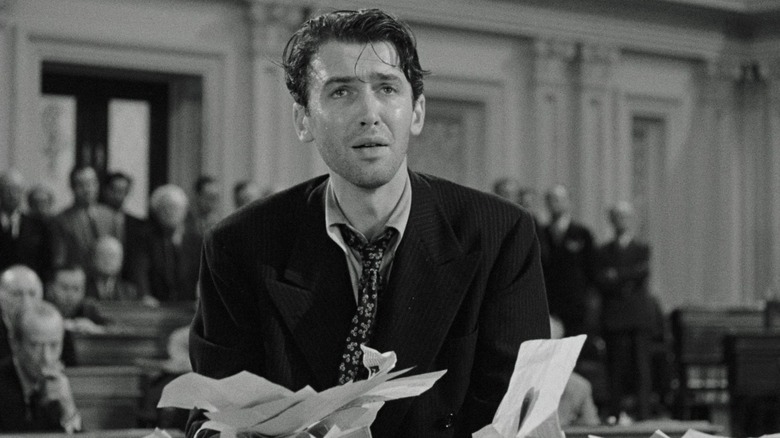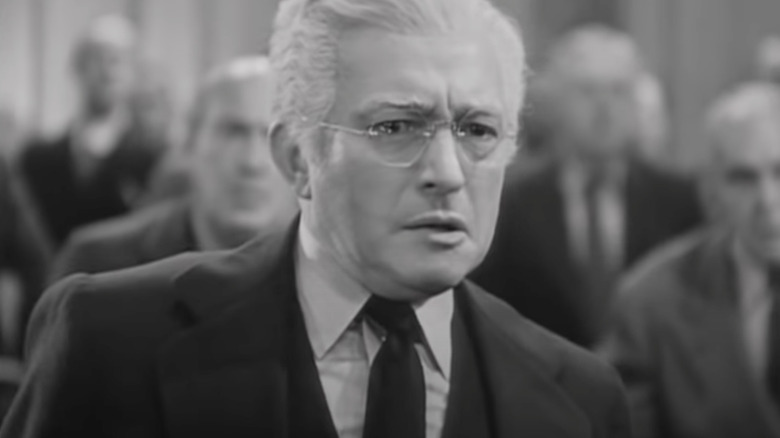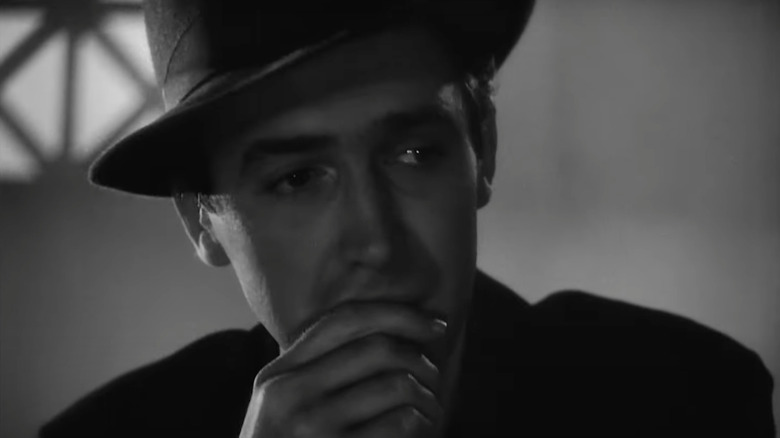
(Welcome to The Daily Stream, an ongoing series in which the /Film team shares what they've been watching, why it's worth checking out, and where you can stream it.)
The Movie: "Mr. Smith Goes to Washington"
Where You Can Stream It: HBO Max
The Pitch: An idealistic young senator enters the corrupt "wilds of Washington" D.C., where he works to bring change in the U.S. political system without sacrificing decency.
Together with "It's a Wonderful Life," "Mr. Smith Goes to Washington" is one of two Frank Capra classics that made the Top 5 on the American Film Institute's list of "100 Years...100 Cheers," the most inspiring movies of all time. It features a star-making performance from Jimmy Stewart and has a long list of other accolades, but it's the aspirational qualities of this film that make it such a salve amid a tough two years on this ball of mud we inhabit.
This week, "Ted Lasso" star Jason Sudeikis led a live virtual read of "It's a Wonderful Life" for charity. It's the perfect marriage of a timeless holiday classic with an actor who is very much of the moment, having won the Emmy in 2021 for Outstanding Lead Actor in a Comedy Series. If you missed the read, you can still catch the encore of it from now until New Year's Day. And if you miss feeling good in general, "Mr. Smith" goes down nice with "Ted" and George Bailey.
The fish-out-of-water plot and character dynamics of "Ted" are actually a closer cousin to "Mr. Smith" -- so much so that "Ted" starts to look like "Mr. Lasso Goes to England" by comparison. Capra's film is one that doesn't see the world through rose-colored glasses, but instead manages to mine optimism out of less-than-desirable circumstances.
Why It's Essential Viewing

In "Mr. Smith Goes to Washington," politics are shade and window-dressing for a story with more universal themes. This is a movie with a great humanist spirit and charm that has kept people coming back to it for over 80 years.
When the Governor chooses Smith to be the new Junior Senator for his state, he expects Smith to be a stooge, much like Lasso, the American football coach set up for deliberate failure with a British soccer team. Smith, too, has people conspiring with the press against him, and it leads him on a journalist-punching spree. For some viewers, this might serve as an uncomfortable parallel to contemporary demonization of the "fake news media" by real-life politicians, but in Smith's case, it ends with self-reflection and the realization that he has a room full of reporters confronting him with harsh truths.
In 2021, the idea of "a young patriot ... turned loose in our nation's capital" obviously has a different connotation to it, thanks to the storming of the U.S. Capitol by a riot mob back in January. This is the same building where Stewart's character stages his own form of nonviolent resistance in "Mr. Smith Goes to Washington." When he first arrives in D.C., before he becomes the target of unflattering photos and headlines, the mere sight of the Capitol inspires childlike wonder in him in a way that would almost be quaint were it not so tainted by recent events.
We see the city's landmarks fresh through black-and-white eyes as he makes his way around town. That's very different from how his firecracker secretary, Miss Saunders, sees them. "When I came here," she says, "my eyes were big blue question marks. Now, they're big green dollar marks."
Jean Arthur And Claude Rains

Before "Mr. Smith Goes to Washington," I had never seen a film with Jean Arthur in it. I had no idea that she was such a big-name actress back in the 1930s and 1940s. But evidently, she was the queen of screwball comedies. In this film, she, as Saunders, helps keep us tethered to earth while Smith has his head in the clouds.
As he projects Old Hollywood innocence and small-town naïveté, the wry cynicism of the modern viewer finds expression in her. She's our Rebecca Welton: someone who has locked up her vulnerable side but whose spirit reawakens as the story goes on. You see her face light up in soft-focus and all the former world weariness melts away, dripping down into a tearjerker bucket.
Smith's father was a "champion of lost causes" — the only ones worth fighting for, in his view — and his history with Senator Paine, played by Claude Rains ("Casablanca"), provides "Mr. Smith Goes to Washington" with its other major lynchpin in terms of character relationships. On the train to Washington, Paine recalls how Smith's father, himself a newspaper editor, stood up to a mining syndicate, only to wind up shot in the back. In a bit of foreshadowing, Smith says, "When a fella bucks up against a big organization like that, one man by himself can't get very far, can he?"
Unbeknownst to him, Paine is in the pocket of a political boss with plans for a dam on the same piece of land where Smith wants to create a national boys camp through his first Senate bill. This leads to a confrontation on Capitol Hill, where one man's voice will echo through the chambers of power ... and leave the building shaken.
Coming Through A Long Dark Tunnel

It's a given that many people will be watching "It's a Wonderful Life" this holiday season, but pair it up with this other vintage Capra/Stewart gem and you won't be disappointed. "Mr. Smith Goes to Washington" offers a pragmatic view of hope and change in a system and indeed world that seems rigged against such things. The performances are soulful and real and resonate across decades as if these people were right before us still.
What gives the movie such enduring appeal is that it shows optimism tested by fire. Smith himself likens it to "coming through a long dark tunnel," being grateful to see daylight again. As the ice melts between them, Saunders says she's "always lived in a tunnel," and there are probably many people who feel they've been living that way the last two years.
It's a rousing triumph to see Smith take a literal stand on the floor of the U.S. Senate, delivering an impassioned speech and a third act for the ages, by way of filibuster. As Saunders sits on the edge of her seat and the Senate leader hides his approving smiles, we're right there with them in the audience and our reactions mirror theirs. At the same time, we can see how the forces of corruption and graft are strongly aligned against Smith outside the building. They have the ability to control information and "make public opinion" and even run kids off the road.
Smith can't change the whole crooked system, but he can change individual hearts and minds and get people on his side, starting with Saunders and ending with the guilt-ridden Paine. "Somebody'll listen me," he says. And he's right. We've been listening for eight decades. The filibuster never ended.
Read this next: The Daily Stream: Redemption Proves Elusive In A Walk Among The Tombstones
The post The Daily Stream: Mr. Smith Goes to Washington Is Chicken Soup for the Cinephile's Soul appeared first on /Film.
via Ecobuynow

.png)



Don't be spammer